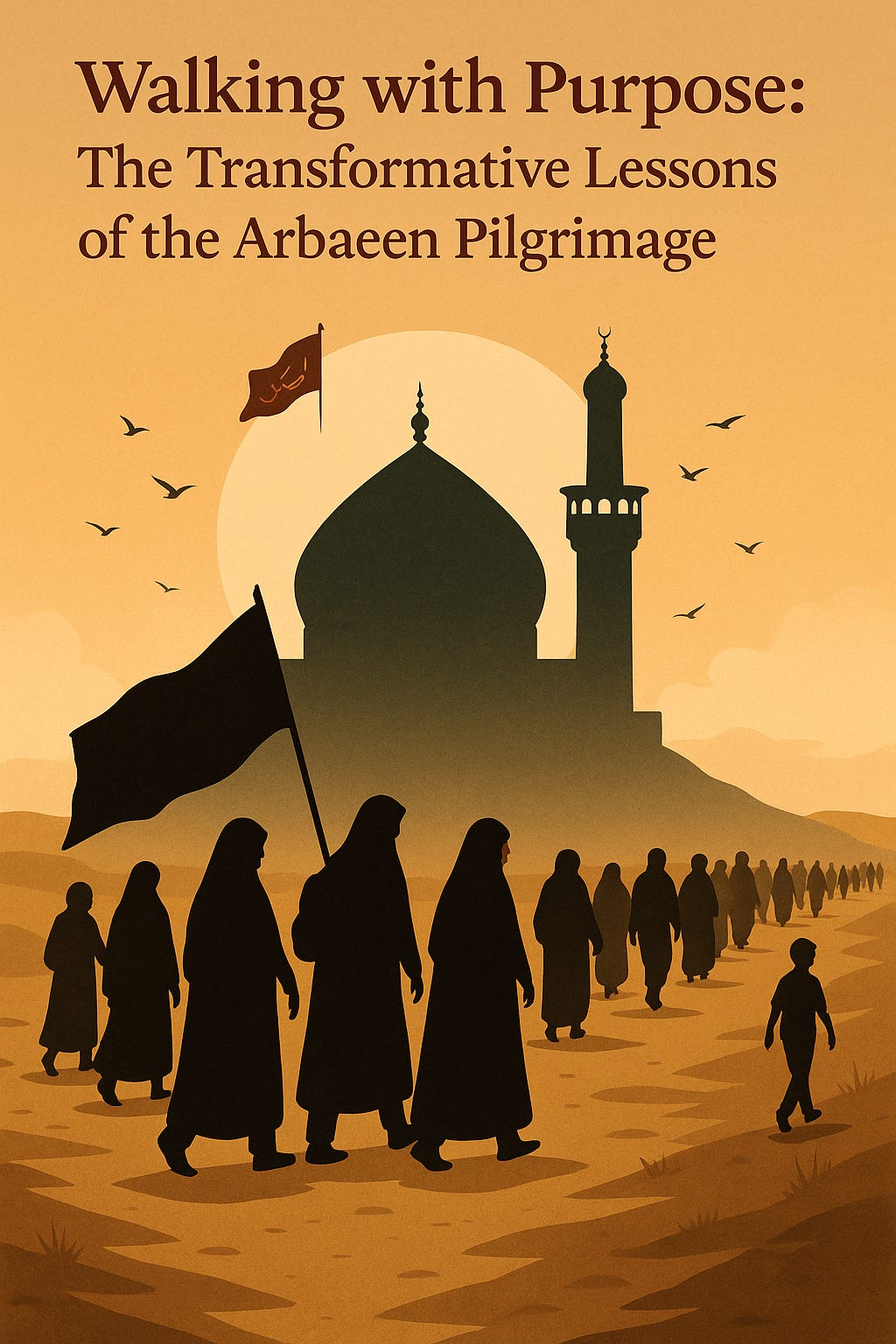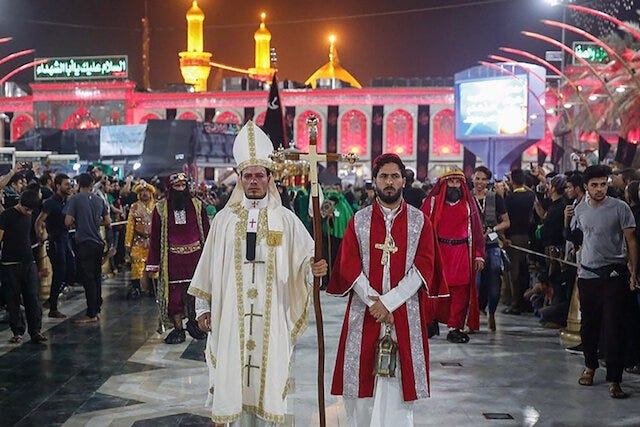Walking with Purpose: The Transformative Lessons of the Arbaeen Pilgrimage
How the World’s Largest Peaceful Gathering Offers Humanity a Path to Justice, Spiritual Awakening, and True Freedom
Every year, millions of people from all walks of life set out on foot to the city of Karbala for Arbaeen—the 40th day after the martyrdom of Imam Husayn ibn Ali (AS), the grandson of Prophet Muhammad (PBUH). It is the world’s largest annual peaceful gathering, yet many in the world have never heard of it. More than just a physical journey, the Arbaeen Walk is a profound spiritual movement filled with lessons that resonate far beyond the borders of Iraq or the limits of any single religion.
In this walk, believers traverse deserts and cities, endure hardships, and serve one another—not for material gain, but for love, loyalty, and truth. The Supreme Leader of the Islamic Revolution, Ayatollah Sayyid Ali Khamenei, has emphasised the significance of this movement. Drawing on his insights, here are some of the most profound lessons the Arbaeen Walk offers the world.
1. A Call to Divine Servitude, Not Slavery to Tyrants
The Arbaeen Walk is not just a commemoration; it is a declaration. It proclaims freedom from oppression, tyranny, and worldliness. Imam Husayn (AS) stood against the corrupt Yazid not just as a political rebel, but as the servant of God, unwilling to give allegiance to an unjust ruler.
By walking toward the shrine of Imam Husayn, pilgrims reaffirm their own allegiance—not to wealth, not to superpowers, not to fame or fear—but to divine justice. It is a rejection of all taghut (oppressive, false authorities) and a renewal of submission to God alone.
2. A Movement that Transcends Nationality, Language, and Class
Perhaps no other event in the world so beautifully demonstrates true human unity. Pilgrims from Iran, Iraq, Pakistan, Nigeria, Lebanon, the UK, the US, India, and countless other countries all walk side by side, serving and being served without regard for language, ethnicity, or wealth.
The lesson is clear: Islam—true Islam—unites. The school of Ahlul Bayt (AS) dissolves barriers and fosters deep brotherhood. At a time when sectarianism and racism plague societies, the Arbaeen Walk offers an alternate vision: one of sincere love between human beings centered on shared values of justice, loyalty, and faith.
3. Imam Husayn (AS) Belongs to All of Humanity
As Ayatollah Khamenei has emphasised, Imam Husayn (AS) is not exclusive to any one group—not to Arabs, not to Iranians, not even just to Shi'a Muslims. He is a universal figure of resistance and dignity.
Just as Jesus (AS) is loved across nations and religions, so too is Husayn ibn Ali (AS) a beacon for anyone who values justice and human honour. His sacrifice resonates with all who yearn for spiritual meaning and moral courage. The Arbaeen Walk is a testament to this: people from all backgrounds walk not because of blood or sect, but because of truth.
4. Service to Others Is the Highest Form of Honor
One of the most moving scenes along the Arbaeen route is the tireless hospitality of the Iraqi people. Many of them live in poverty, yet they give everything they have—food, shelter, water, medical care, even massages—to the pilgrims walking toward Karbala.
These people don’t ask for thanks. They serve out of love for Imam Husayn (AS), seeing each pilgrim as a guest of the martyr. The lesson here is immense: true honor lies in service. When society builds itself on this model—rather than selfishness and greed—it becomes a source of healing, not harm.
5. Courage in the Face of Tyranny
Imam Husayn (AS) knew he would be killed. But he stood anyway, because standing against injustice—even if it leads to death—is better than living in submission to falsehood.
The Arbaeen Walk reminds us of this moral courage. It teaches us that silence in the face of oppression is betrayal, and that we must speak out—whether against colonialism, corruption, or injustice in our own communities. The blood of Karbala cries out: “Never bow to tyranny.”
6. The Centrality of Religion in Public Life
In the secular world, religion is often pushed to the margins, seen as a private matter. But the Arbaeen Walk shows something very different: religion is alive, public, and deeply transformative. It organises, motivates, and unites millions—not through coercion, but through love.
This mass movement teaches that Islam is not just prayer and fasting. It’s a way of life, a path that governs politics, ethics, family, and society. True Islam doesn’t hide in the shadows—it walks boldly, proudly, toward truth.
7. A Universal Model of Resistance
The story of Karbala is not bound by time. Imam Husayn (AS) lives on as a symbol for all oppressed peoples. Whether it is the Palestinian child resisting occupation, the Yemeni mother enduring blockade, or the Nigerian mourner marching in memory of the martyrs—the spirit of Husayn (AS) flows through them.
Arbaeen reminds us: resistance is sacred. As long as there is injustice, there must be Husaynis. And as long as there are Husaynis, there is hope.
8. The Power of Collective Memory
Why do millions gather every year for a tragedy that took place over 1,400 years ago?
Because memory is resistance. Forgetting Karbala would mean forgetting what it means to be free. Remembering it keeps the flame of truth alive. The Arbaeen Walk is not just a journey of feet—it is a journey of hearts, of remembering what matters most in life: loyalty, sacrifice, truth, and the love of God.
Conclusion: From Karbala to the World
The Arbaeen pilgrimage is more than a religious ritual—it is a spiritual revolution. Every step taken toward Imam Husayn (AS) is a step away from ego, from injustice, from forgetfulness of God.
In a world drowning in distraction, the Arbaeen Walk calls us back to our purpose. It reminds us of the price of freedom. It teaches us how to live—and how to die—with dignity.
And it invites all of humanity—Sunni and Shi’a, Muslim and non-Muslim, East and West—to walk with Husayn, toward a better world.
Reference: The Official Website of Ayatollah Khamenei



